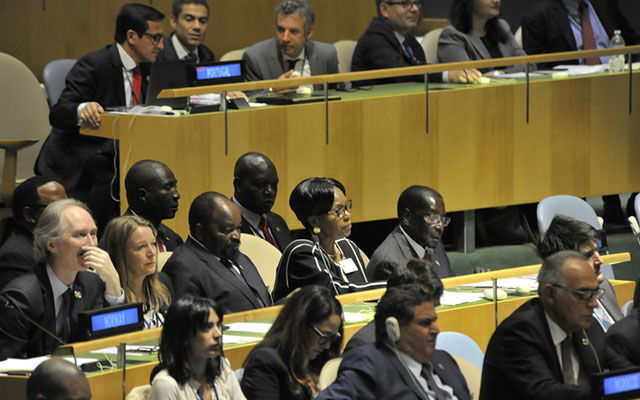Zim committed to implementing SDGs


President Mugabe (middle row) follows proceedings during the official opening of the High-Level Conference on the Implementation of Sustainable Development Goal 14 at the UN in New York yesterday. He is flanked by Foreign Affairs Minister Simbarashe Mumbengegwi (third from left) and Environment, Water and Climate Minister Oppah Muchinguri-Kashiri
AT the outset, I wish to commend the governments of Fiji and Sweden for the initiative to convene this conference, the first of its kind dedicated to a specific Sustainable Development Goal (SDG). The ‘‘Call for Action’’ that we will adopt as the conclusion to our deliberations and interactions should spur the implementation of SDG14. It should also give impetus to the implementation of all other SDGs in view of the integrated and interconnected character of the goals. We must therefore strive to have all tracks of the SDGs move at a uniform speed to ensure that our ship maintains an even keel and keeps the course we have plotted for it.Co-Presidents,
The oceans and the seas are a vital resource to all of us, irrespective of our geographical location on this planet. Developments around, on or under the oceans affect coastal and landlocked countries alike, admittedly with varying degrees and significant existential ones in the case of small island developing states.
Co-Presidents,
Oceans have rightly been referred to as life-givers not only in supplying oxygen but also as a major source of food and nutrition for humankind. They have also been identified as a climate regulator in their function as a carbon sink. It is evident that we cannot live without them. Their health and their continued capacity to sustain lives and livelihoods is thus a universal preoccupation. We are, therefore, concerned by the alarming degradation of the marine environment and the depletion of its biodiversity. It is time for all of us to act to prevent the further deterioration of this common heritage of humankind.
Co-Presidents,
The oceans and seas contribute significantly to the development of my country, in their capacity as a mode for the conveyance of goods between my country and the outside world. That contribution is set to grow and increase in the coming years as we opt for greener modes of transporting our exports. Sea freight will be a preferred choice for its environmental friendliness and higher carrying capacity than airfreight.
Co-Presidents,
One of the challenges identified in the implementation of SDG14 is that of the unsustainable extraction of marine resources. Developing countries have suffered most and continue to suffer most from illegal, unreported and unregulated fishing in their waters. We call for an end to these illegal practices which prejudice the development prospects of the affected developing countries.
We also call for increased support to developing countries to capacitate them to derive optimum benefits from the exploitation of their marine environments. In this regard, we support the voluntary commitment made by our sub-regional organisation, the Southern Africa Development Community, to establish and strengthen existing Regional Fisheries Monitoring Control and Surveillance Mechanisms in Eastern Africa, Southern Africa and the Indian Ocean regions.
Co-Presidents,
At the Rio+20 Summit in June 2012 we all committed to develop, on an urgent basis, a new legally binding international instrument, under the United Nations Convention on the Law of the Sea, for the conservation and sustainable use of marine biodiversity in areas beyond national jurisdiction. Almost five years later, that instrument is not yet in place. We urge the Ad Hoc Open-Ended Informal Working Group to expedite the development of this legally binding international instrument.
Co-Presidents,
In the implementation of SDG14, as in the implementation of all the other SDGs, we have underlined the need for capacitating developing countries through the provision of finance and affordable access to technology. We have also underlined the importance of partnerships at all levels, from the national to the global level.
I wish to remind some partners that while they may exclude my country from some financial and technical assistance facilities because of the illegal sanctions they maintain against us, the effects of climate change are not discriminatory. My country is committed to implementing the SDGs and will do so within the means available to it. I believe that it is in the best interest of all of us that we prioritise life above everything else.
I thank you.








Comments